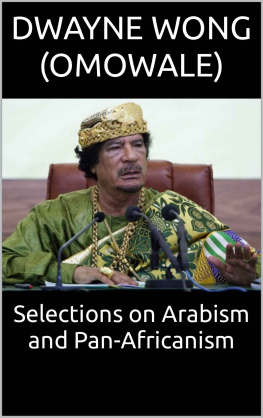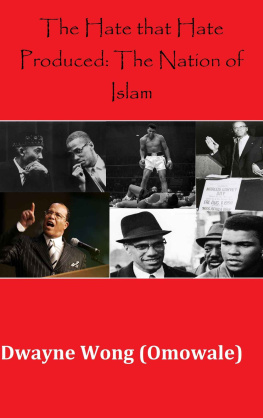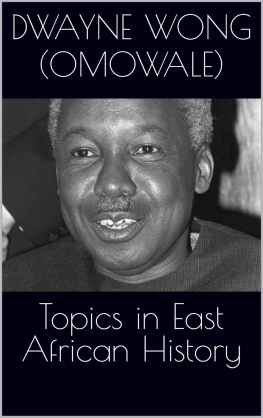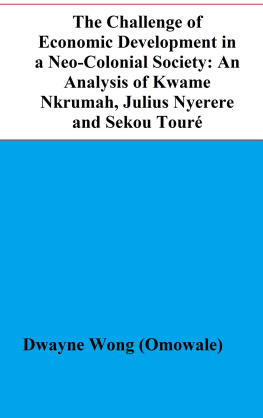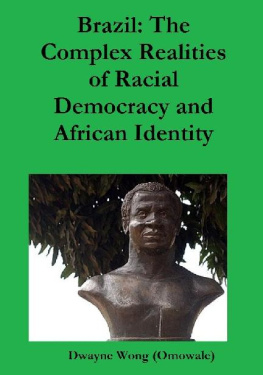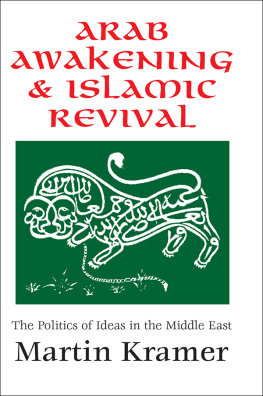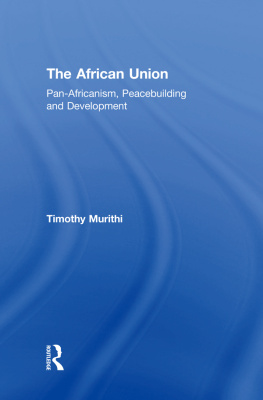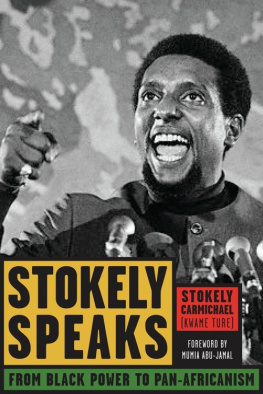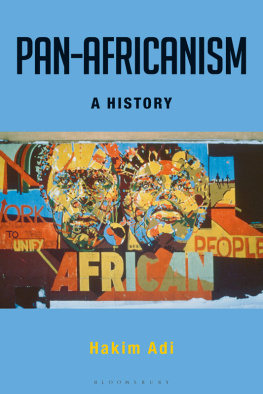Dwayne Wong (Omowale) - Selections on Arabism and Pan-Africanism
Here you can read online Dwayne Wong (Omowale) - Selections on Arabism and Pan-Africanism full text of the book (entire story) in english for free. Download pdf and epub, get meaning, cover and reviews about this ebook. year: 2022, genre: Science / Politics. Description of the work, (preface) as well as reviews are available. Best literature library LitArk.com created for fans of good reading and offers a wide selection of genres:
Romance novel
Science fiction
Adventure
Detective
Science
History
Home and family
Prose
Art
Politics
Computer
Non-fiction
Religion
Business
Children
Humor
Choose a favorite category and find really read worthwhile books. Enjoy immersion in the world of imagination, feel the emotions of the characters or learn something new for yourself, make an fascinating discovery.
- Book:Selections on Arabism and Pan-Africanism
- Author:
- Genre:
- Year:2022
- Rating:3 / 5
- Favourites:Add to favourites
- Your mark:
- 60
- 1
- 2
- 3
- 4
- 5
Selections on Arabism and Pan-Africanism: summary, description and annotation
We offer to read an annotation, description, summary or preface (depends on what the author of the book "Selections on Arabism and Pan-Africanism" wrote himself). If you haven't found the necessary information about the book — write in the comments, we will try to find it.
Dwayne Wong (Omowale): author's other books
Who wrote Selections on Arabism and Pan-Africanism? Find out the surname, the name of the author of the book and a list of all author's works by series.
Selections on Arabism and Pan-Africanism — read online for free the complete book (whole text) full work
Below is the text of the book, divided by pages. System saving the place of the last page read, allows you to conveniently read the book "Selections on Arabism and Pan-Africanism" online for free, without having to search again every time where you left off. Put a bookmark, and you can go to the page where you finished reading at any time.
Font size:
Interval:
Bookmark:
Selections on Arabism and Pan-Africanism
by
DwayneWong (Omowale)
Copyright 2022Dwayne Wong (Omowale)
All rightsreserved.
African Oppression in the Islamic World
Many of you have heard of the island calledZanzibar. Zanzibar was famous for its headquarters as a slave-trading post; infact, many of us probably passed through there on our way to America 400 yearsago. And it was on this island some time last year, I think it was, that thegovernment was overturned when the African element on the island got fed upwith the situation that existed. Overnight they did what was necessary to bringabout a change. So today Zanzibar is free.
-Malcolm X
Before the Europeans devastated Africancivilizations with slavery and colonialism, Africa had to face the onslaught ofIslamic imperialism in the region. This onslaught was led primarily by Arabsand the Ottoman Turks. From the onset I wish to point out that the classificationArab is more of a cultural one than a racial one. This is an importantdistinction that needs to be made because many people that may be culturally orlinguistically Arab, may not necessarily be ethnically Arab. The term Arab specificallyrefers to the people of the Arabian Peninsula. Arab conquests began the processof Arabization of many populations, including some Africans. For this reason I wish to clarify that the Arabs being spoken aboutin this essay are generally those who are ethnically non-African, althoughthere are also examples of Arabized Africans also participating in the Araboppression and subjugation of African people.
The Islamic enslavement of African peoplepredated the European slave trade by many centuries, and as was the case withthe European slave trade, Arabs often came to view Africans as an inferiorpeople that were suited only for subjugation. Ibn Khaldun believed that theNegro nations are, as a rule, submissive to slavery, because (Negroes) have littlethat is (essentially) human and possess attributes that are quite similar tothose of dumb animals. The enslavement of African people was such a prominentfeature of Arab society that the first African to accept the religion of Islamwas Bilal, who was himself a slave.
In The Iberian Roots of American RacistThought, James H. Sweet attempts to argue that the ideology of racism thatcame to dominate slavery in the Americas had already been in existence inIberia prior to the slave trade. Sweet further argues that racism in Iberiaactually developed out of the African slavery in the Islamic world. Regardlessof whether or not it was Arabs that brought racism to Europe, it was certainlytrue that Arabs came to develop an attitude of racial superiority over Africanpeople, although, as John Coleman De Graft-Johnson explained, Arabs did notbelieve in any herrenvolk theory andfreely intermarried with those they conquered.
Arab imperialist expansion began in 632after the death of the Prophet Muhammad. The Rashidun Caliphate took control ofthe Arabian Peninsula, and spread to parts of North Africa, including Egypt. Thisbegan the spread of Islam and Arabic culture into Africa. At the beginning ofthe 16th century, the Arab nations were subjugated by the Turks inorder to expand the Turkish Ottoman Empire. In 1514, Sultan Selim I conquerednorthern Iraq. By 1516 he managed to take Syria and Palestine from Egypt beforeconquering Egypt itself. The Ottomans would go on to establish one of thelargest empires of their day.
Arab and Turkish dominated Egypt mademultiple attempts at seizing the Sudan before they were finally successful. In643, Abdullah decided to send an expedition into Makuria .Abdullah had fallen into their trap. The Makurian troops retreated, giving the Arab army a false sense of confidence. When the Arabs advanced further into Makurian territory, the Makurian army turned around and assaulted the Arab army, almost wiping it out. Reportsfrom the battle note that the King of Makuria personally commanded his troops in combat. One of the factors for the Africanvictory in this battle was the skilled archery of the Makurian troops.
In 651, eight years later, the viceroy ofEgypt sent another army to avenge the previous defeat. The army made their wayto the capital city of Dongola. They captured the capital city and destroyedthe major building. Despite the destruction of their capital city, King Kalydosos decided not to surrender. Instead, he regrouped with hisforces and they continued fighting. The fighting lasted until both sidesdecided to sign a peace treaty. Kalydosos hadsuccessfully saved his nation from falling under Arab domination.
Muhammad Alis rise to power would see yetanother Egyptian incursion into the Sudan. In 1805, the people of Cairo rose upin protest against Khurshid Ahmad Pasha, who was the Ottoman governor of Egyptat the time. The protestors demanded that the Ottomans appoint a governor thatthey selected. The protestors selected Muhammad Ali to be their governor,although he was reluctant at first. Ali established a powerful army, which heused to expand Egyptian territory. One of the key reasons that Ali was able tostrengthen his army was through the usage of European technology. In 1811,Muhammad Ali sent his troops to Arabia where he destroyed the recentlyestablished Wahhabi government.
Muhammad Ali sought to extend his empirefurther south by invading the Sudan. He was looking to find gold mines and tobring back slave soldiers for his army. This campaign proved to be easier thanthe previous one in Arabia, as the Sudan was much closer to Egyptthe twonations were linked by the Nileand the people of the Sudan were not as unifiedas the Wahhabi had been. Most of the people lived in small communalterritories, with the largest state being Sennar ofthe Funj dynasty, which was at the time ruled by BadiVII. The Sudanese also did not have firearms or artillery.
Alis son Ismail was sent on thisexpedition. It was relatively easy and by early 1822 most of the East Sudan wasunder Egyptian control. There was an uprising in Sennar ,which forced Ismail to put it down. He suppressed the uprising and killedthousands. Ismail himself was captured and killed. A local leader named NairNimr invited Ismail for a feast, which turned out to be a trap. Ismail and hiscompanions were trapped in the house and then the house was set on fire.Hearing the news of Ismails death, the Egyptian forces killed 30,000 of thelocals in the region where Ismail was killed, though Nair Nimr escaped.
The struggles between Egypt and the Sudanwould also play an important role in the British conquests in East Africa. In1881 there was an uprising in response to the European incursion into the Sudanled by a Dervish monk named Muhammad Ahmed. He proclaimed himself to be the Mahdi,who in Islam is believed to be a messiah whose rule is to coincide with thesecond coming of Jesus. The Dervishes were opposed to European rule, and theysaw the Turks and Egyptians as being corrupt and false Muslims. Muhammad Ahmedsaw his war as being a holy war, much like the one waged by the ProphetMuhammad. The Mahdis second in command was Khalifa Abdullah, who would takeover the movement when the Mahdi died.
Muhammad Ahmeds following comprisedmostly of peasants, slaves, and others that occupied a lower economic status inthe Sudan. No doubt what attracted these people to the movement was the messageof sharing property and land that Muhammad Ahmed preached. The wealthy feudallords and slave traders in the Sudan, on the other hand, reacted negatively tothe Mahdist uprising. The Mahdi state made certain reforms which benefitted thepoor and enslaved, such as forbidding the trade in male slaves andsignificantly reducing taxes, but the female slave trade continued, however.Slavery itself was not abolished, although slaves joined the Mahdist movementin hope that they would be liberated. Eventually there were slave uprisingsagainst the Mahdi state itself. There were also ethnic struggles within theMahdi state because the Kordofan tribe was in a privileged position over otherethnic groups. The various internal conflicts within the Mahdi state weakenedit greatly.
Next pageFont size:
Interval:
Bookmark:
Similar books «Selections on Arabism and Pan-Africanism»
Look at similar books to Selections on Arabism and Pan-Africanism. We have selected literature similar in name and meaning in the hope of providing readers with more options to find new, interesting, not yet read works.
Discussion, reviews of the book Selections on Arabism and Pan-Africanism and just readers' own opinions. Leave your comments, write what you think about the work, its meaning or the main characters. Specify what exactly you liked and what you didn't like, and why you think so.

